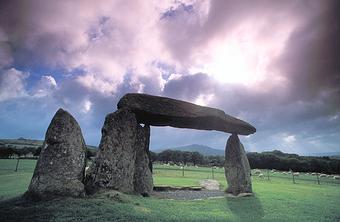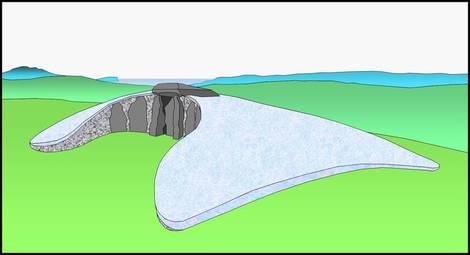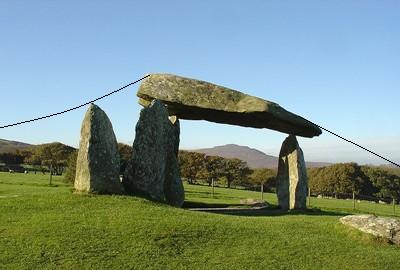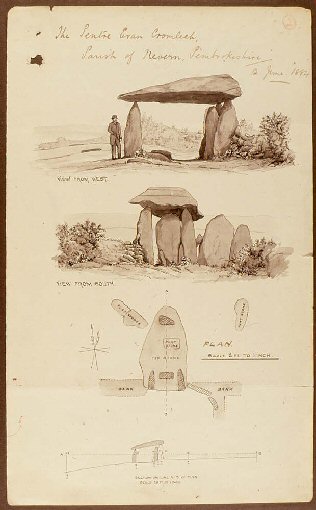|
Location:
Nr Nevern, Pembrokeshire,
Wales. |
Grid Reference:
51� 59′ 56.4″ N,
4� 46′ 12″ W. |

 Pentre Ifan:
(Passage Mound - Court Tomb).
Pentre Ifan:
(Passage Mound - Court Tomb).
The largest and best preserved Neolithic dolmen in Wales.
Although very little remains of the original structure, this is still an
impressive site to see.
The estimated 16-ton capstone rests delicately on three
tapered stones, its angle reflecting the slope of the
Carn Ingli ridge visible on
the western skyline.
(Click here for
map with location)
| Pentre
Ifan:
('Arthur's Quoit', 'Pentre Ivan / Evan') |
One of the most popular and
visually rewarding megalithic sites
in Wales, Pentre Ifan is a splendid dolmen with a huge capstone delicately
poised on three uprights. Once known as Arthurs' Quoit, 'Pentre Ifan'
means 'Ivan's Village'.
Description
-This monument dates from around 4,000
(3) - 3,500 BC and was
unusually oriented opening to the south, standing on the slope of a ridge commanding
extensive views over the Nevern Valley and Fishguard Bay.
What we see today is but a fragment of the original structure,
The capstone weighs
over 16 tons; it is 5m (16ft 6in) long and 2.4m (8ft) off the ground. The
stones of the chamber are all of local igneous rock; on the portal stone
there is a faint decorative cup-mark.
Excavations in 1936-7 and
1958-9 showed that the dolmen originally lay within a shallow oval pit, and that
the trapezoidal mound of earth covering it was up to 36m (120ft) long. The
semi-circular fa�ade, as in the Irish passage mounds/court-tombs, was marked by
two upright stones on either side of the south-facing portal. The forecourt was
blocked with rows of tightly wedged stones; some of the original kerbstones
around the barrow can still be seen. Within the cairn were a number of enigmatic
features: a slumped stone, deliberately felled before the cairn was built, an
irregular line of small stone-holes and a pit with signs of burning.

Artistic Impression of the
Original design.
On June 20 1884 � two years after parliament passed John Lubbock�s
Ancient Monuments Act, and a mere 12 days after General Augustus Pitt Rivers
visited the site to assess its suitability � the great Neolithic 'Burial chamber' at Pentre Ifan, Pembrokeshire, became Wales�s first scheduled
ancient monument. (1)
(The number
of artefacts discovered was very small, and included no trace of burial).
Extract:
'The Fairy Faith in Celtic countries' by W.Y. Evans Wentz, 1911.
"The region, the little valley on whose side stands the
Pentre Ifan cromlech, the finest in Britain, is believed to have been a
favourite place with the ancient Drulds. And in the oak groves (Ty Canol Wood)
that still exist there, tradition says there was once a flourishing school for
neophytes, and that the cromlech instead of being a place for internments or
sacrifices was in those days completely enclosed, forming like other cromlechs a
darkened chamber in which novices when initiated were placed for a certain
number of days....the interior (of Pentre Ifan) being called the womb or court
of Ceridwen".
Pentre Ifan and the Landscape:
'It has been noted that the slope of the dolmen�s
capstone echoes the angle of the Carn Ingli ridge visible on the western
skyline from Pentre Ifan (see image above). Carn Ingli
(�Hill of Angels�) was considered sacred up until early Christian times,
when local anchorite, St. Brynach, would repair to the peak to fast and have
visions of angels. The hill also harbours noteworthy magnetic anomalies.
Also, the striking, highly distinctive rock clusters known as Carnedd
Meibion-Owen are visible precisely on the south-western skyline from Pentre
Ifan'.(2)

It is likely that in
its original completed form, the overall shape of the structure would have
mirrored the outline of distant Carn Ingli.

A
sketch of the 'Cromlech' from 1884. (Click on the image for an enlarged
view).
(Other Passage Mounds)
(Dolmens Homepage)
(Other Welsh Sites) |



